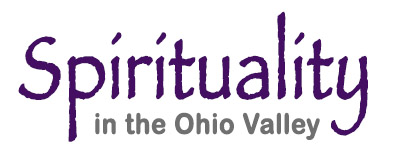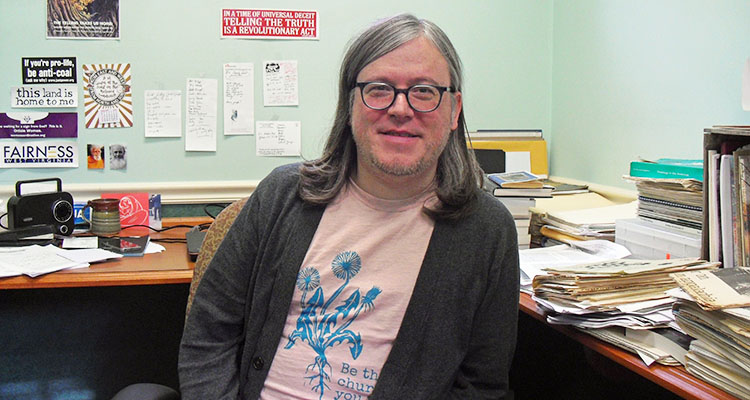Editor’s note: As part of a continuing series on how Ohio Valley residents express their spirituality, Weelunk recently visited with a Wheeling man whose spiritual/social-justice calling includes bringing even those misdeeds done inside the church world into the light. Here is his story.
Just going to the grocery store can be a challenge when your calling, your spiritual work is the pursuit of truth and justice — particularly truth about sexual misconduct inside the ministry.
A breeze by the frozen green beans can yield a surprising thumbs up from a highly placed priest. Or, in another aisle, Michael Iafrate could just as likely hear the question, “Why are you attacking the church?” If not that, it could be something like, “How can you defend a church that condones criminal behavior?”
The Wheeling Jesuit grad, co-coordinator of the Catholic Committee of Appalachia, reflected on this contrast of perspectives from his unassuming office in downtown Wheeling.
“I can’t be a Catholic and not fight for a better church,” he concluded in a gentle voice that matches his John Denver-meets-Mr. Rogers vibe. “I can’t be a Catholic with my back to the people who Catholicism hurts.”
 Right now, that means he, co-coordinator Jeannie Kirkhope, the committee and committee friends have a heavy focus on the sexual-misconduct revelations that are unfolding at a weekly, if not daily, pace in the news. The nearly 50-year-old, small-grant-funded group advocates for a broad variety of social-justice issues in a 20-diocese region that includes parts of Pennsylvania. A cloud of dirt from grand jury reports in that state concerning priestly sexual abuse had barely settled when the scandal turned local. Really local.
Right now, that means he, co-coordinator Jeannie Kirkhope, the committee and committee friends have a heavy focus on the sexual-misconduct revelations that are unfolding at a weekly, if not daily, pace in the news. The nearly 50-year-old, small-grant-funded group advocates for a broad variety of social-justice issues in a 20-diocese region that includes parts of Pennsylvania. A cloud of dirt from grand jury reports in that state concerning priestly sexual abuse had barely settled when the scandal turned local. Really local.
The recent resignation of Bishop Michael Bransfield as head of the Diocese of Wheeling-Charleston under accusations of sexual misconduct toward adults and lavish living at parishioners’ expense cannot help but take center stage for the moment, Iafrate said of committee responses that have included publishing letters demanding accountability.
Since Bransfield’s resignation, more local connections to the scandal and more committee responses have followed. The nearby Steubenville, Ohio, diocese recently released a list of “credible” accusations against priests. Information about a specific Steubenville priest who impregnated an underage altar girl was also announced. (That priest, Henry Christopher Foxhoven, 45, of Glouster, was sentenced this week to 12 years in prison following a guilty plea to three sexual battery counts.)
Iafrate, who had already discovered regional interconnectedness meant he knew three of the priests on the Pennsylvania lists, was on high alert. He pondered the word “credible.” He looked carefully at the story surrounding Foxhoven, who was soon reported by several sources to have been volunteering with youth activities within West Virginia. He also noticed the general list had limitations he found troubling.
He specifically challenges a list detail that he suspects few outside the Catholic Church would understand. For example, in Steubenville, he said the only released names were those of “diocesan priests” attached to a specific parish. Other Steubenville-area priests — such as Franciscans, Dominicans or Jesuits serving in various capacities — were not included, he said.
That distinction had him on the phone with the Diocese of Wheeling-Charleston, which has promised to release a similar list of accusations made in West Virginia over the last 50 years. Will all priests be included, he asked on behalf of the committee. The local diocese, under interim leadership by a bishop from outside the state, assured him they will. Does that include priests who cross diocese borders to volunteer, such as Foxhoven? Again, Iafrate was pleased with the response.
The local diocese, he said, has, in fact, already gone on to issue an announcement about Foxhoven’s in-state activities in both internal parochial school communications and to the general church membership in recent days.
Pleased? Yes. But, Iafrate said the committee is not yet satisfied. “I would like to see the diocese be more transparent about what they know, how they handled abuse, how they failed to handle the abuse.”
“I would like to see the diocese be more transparent about what they know, how they handled abuse, how they failed to handle the abuse.” — Michael Iafrate
He would also like to see external civil investigations in addition to the internal ones promised by the Diocese of Wheeling-Charleston. The committee may approach state Attorney General Patrick Morrissey to request he follow up on a recent mention of interest in an investigation.
This blend of internal and external advocacy is also expressed at ccappal.org, a website the committee manages. There, diocese news releases are available alongside secular reporting from story leaders like the Boston Globe and the Philadelphia Inquirer.
Indeed, Iafrate said he depends on such secular news, which some church officials have called “media attacks,” to give the issue broader context. He pointed to a specific joint Globe/Inquirer report printed in early November. It gave extensive details about the allegations against Bransfield that he has not seen reported elsewhere.
Iafrate — wearing a T-shirt that reads, “Be the church you want to see in this world,” and chipping away at the dissertation stage of a doctorate in theology — pauses for a deep breath at this point in the interview. Keeping that kind of advocacy in balance with his own Catholicism is what it is. He notes his “very Catholic” family includes a priest and a deacon and that he recently had his infant daughter baptized into the faith.
“I don’t think the truth is an attack. Jesus said the truth will set us free,” he said. “I love the church as the people of God. The Catholic faith is beautiful. It orients my life. I think it changes the world when it’s operating the right way. … But, when the church is hypocritical (it) actually hurts people through the way it behaves.”
• Nora Edinger writes from Wheeling, W.Va., where she is part of a three-generation, two-species household. A long-time journalist, she now writes in a variety of print and e-venues, including her JOY Journal blog at noraedinger.com. Her first work of fiction, a Christian beach read called “Dune Girl,” is available on Amazon Kindle.


